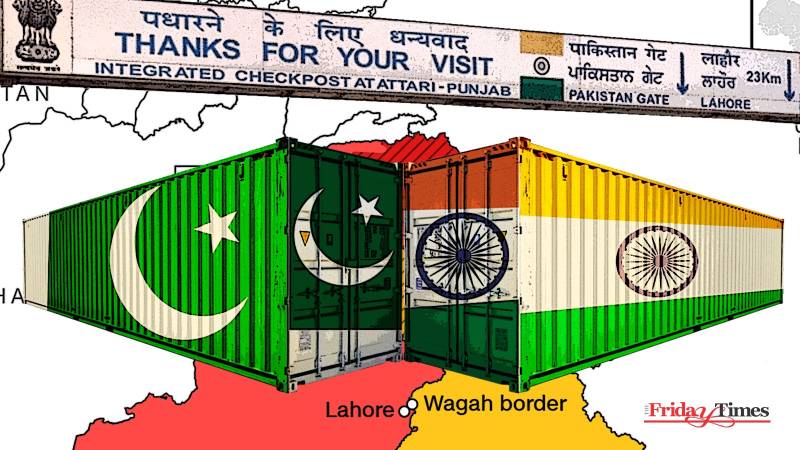
India has taken a firm stance against Pakistan's desire to resume trade and economic activities suspended in 2019. The Indian Foreign Minister, Dr. Jaishankar, has clarified that talks, trade, and terrorism cannot go hand in hand, and relations with Pakistan cannot improve as long as terrorism remains an issue.
The hostility between India and Pakistan has persisted for over seven decades and is a matter of international concern due to the presence of nuclear weapons. Both countries have engaged in costly security competition and often clashed over entrenched interests, with no end in sight. Xenophobia, hyper-nationalism, and mistrust are the factors that fuel the mutual hostility between the two nations. The hostility has increased due to occasional military clashes.
India's frustration with Pakistan escalated after terrorist attacks on Indian soil perpetrated by terrorist groups based in Pakistan. Pakistan's reluctance to act against the perpetrators complicated the situation. Consequently, India changed its strategy, moving from limited engagement to covert operations and diplomatic and economic pressure. India's tactics of attrition have been hurting Pakistan as intended.
Despite sustained efforts, India has not been successful in getting Pakistan declared as a rogue state and a state sponsor of terrorism. However, India has managed to constrain Pakistan by leveraging threats of blacklisting and sanctions. India's stronger stance reflects its determination to address cross-border concerns through actions, not talks.
Previous attempts to normalize the India-Pakistan relationship have often generated optimism, only for incidents to derail progress and intensify tensions, resulting in a cyclical pattern of taking one step forward and two steps back.
Thus, India will likely reject an offer from Pakistan to restart trade, as doing so would undo years of effort to isolate Pakistan. India hopes to hurt Pakistan's weak economy by cutting off trade and economic cooperation, forcing policy changes. Resuming trade would loosen that economic noose and reduce India's leverage.
Currently, India and Pakistan's trade is negligible, but a 2018 World Bank report suggests that potential trade could be worth around US$37 billion in normal conditions. India's trade could form a significant part of Pakistan's total foreign trade of US$101 billion. In contrast, India's total foreign trade is $1.6 trillion, making Pakistan's trade less significant to India. The financial benefits of increasing trade with Pakistan are outweighed by the political costs, making it an unattractive option for India.
Moreover, India is a rising global superpower with broad international support and fewer constraints on asserting its interests over Pakistan. It dominates the region geopolitically, economically, and militarily. Due to this superiority, it holds most of the cards in its relationship with Pakistan.
Meanwhile, Pakistan is weaker due to constant political turmoil, a struggling economy, and an international reputation for supporting extremism. This unequal balance of power between the two rivals gives India more leverage in negotiations or disputes. It holds a stronger position and will not make concessions.
Previous attempts to normalize the India-Pakistan relationship have often generated optimism, only for incidents to derail progress and intensify tensions, resulting in a cyclical pattern of taking one step forward and two steps back. Internal politics and external pressures frequently hampered these efforts, making progress frustratingly slow and often temporary. These dynamics have created an environment where even diplomatic communication and confidence building between the two countries has become difficult.
India views the status quo and disengagement with Pakistan as a better policy due to the lack of trust and poor track record of past talks. It has no incentive to resume composite dialogue, and it feels it can raise the costs of Pakistan's use of terrorism through diplomatic isolation. Re-engaging Pakistan also has domestic political risks for any Indian government, as Indian public opinion deeply distrusts Pakistan.
India wants to be a great power, but its rivalry with Pakistan could drain its resources and global credibility. Refusing to engage Pakistan is politically expedient, but it risks continued tensions and unending conflict.
Instead, India will likely continue putting unrelenting pressure on Pakistan after the Indian election. Many people expect the BJP, led by Prime Minister Modi, to win the election. The ball is now in Pakistan's court to create the right conditions to convince India that it is a reliable negotiating partner.
Pakistan will need to make hard decisions, like giving up unrealistic expectations of changing the status quo in Kashmir. Moreover, it must accept that its ruinous competition with India is no longer sustainable due to a lack of resources, a weak economy, and limited international support. Unfortunately, it is hard for Pakistan's decision-makers to accept this reality.
Time will tell if India can manage Pakistan long-term by relying on deterrents, not engagement. India wants to be a great power, but its rivalry with Pakistan could drain its resources and global credibility. Refusing to engage Pakistan is politically expedient, but it risks continued tensions and unending conflict.
Lasting South Asian stability requires India and Pakistan to prioritize pragmatic diplomacy. Both countries must overcome ideology and nationalist politics. Trade can improve ties and bring prosperity to the region, but it requires trust, respect, and a commitment to addressing divisive issues.

